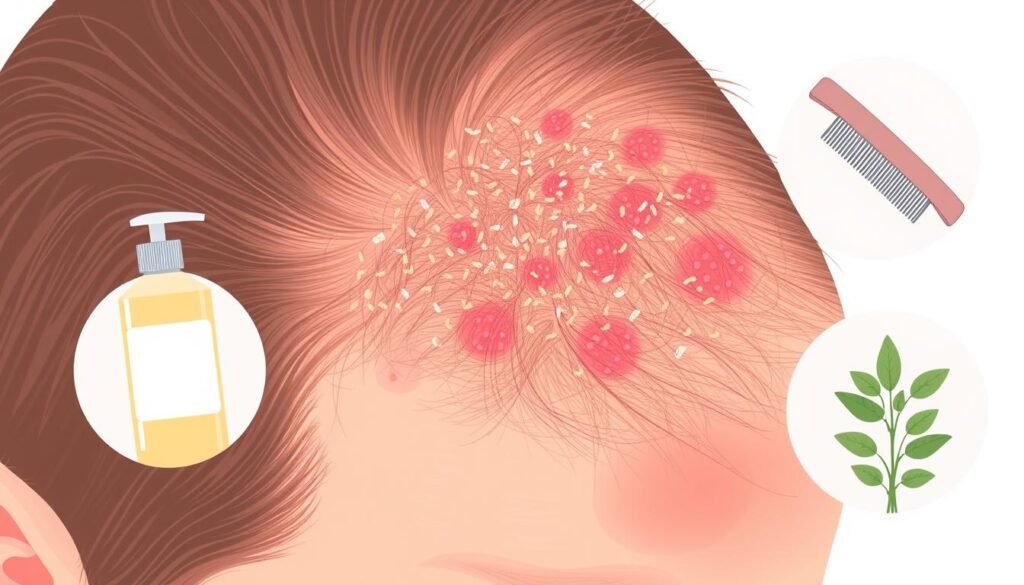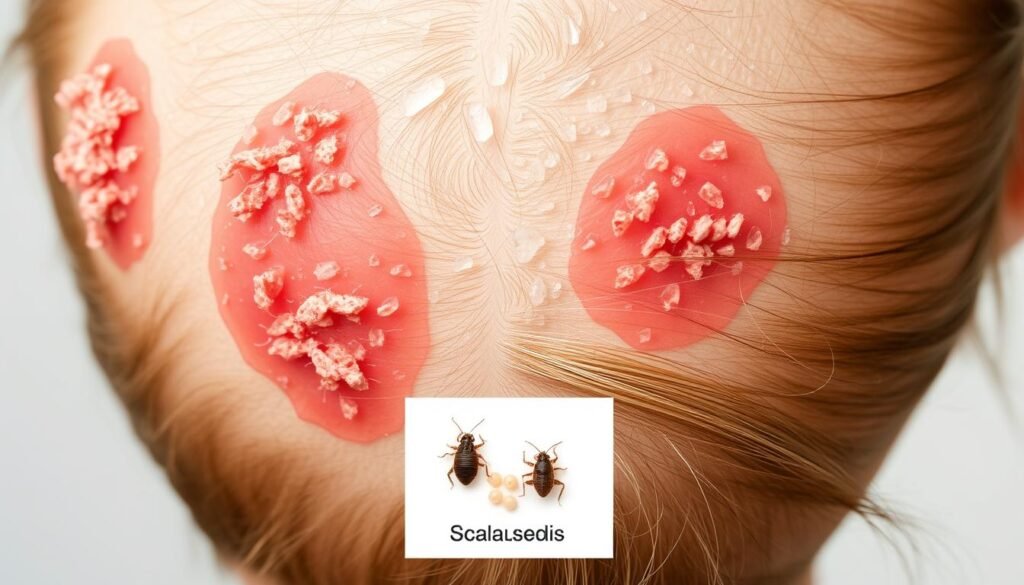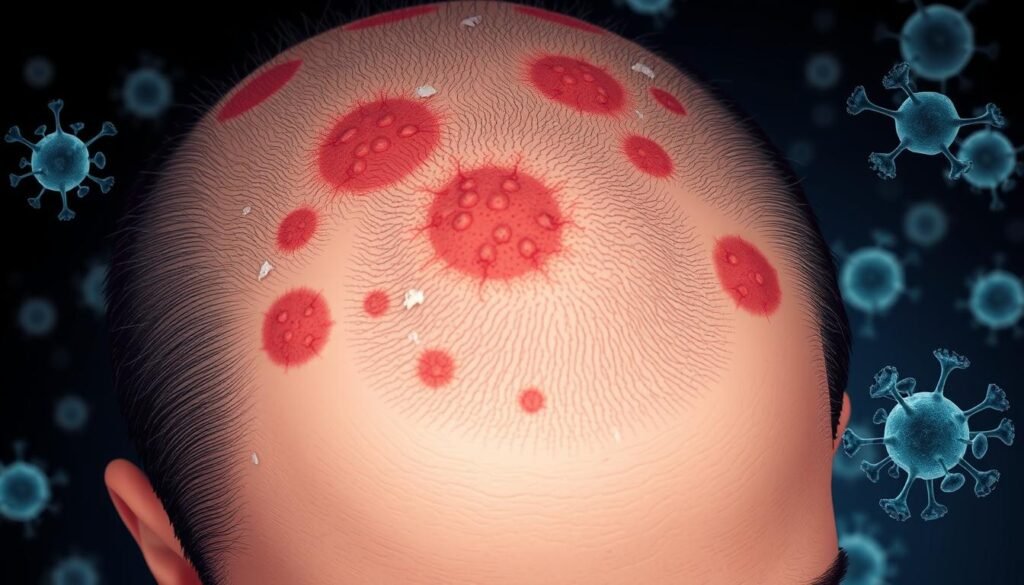Did you know oily hair could make your scalp itch more? This happens especially three days after shampooing. This fact shows how common itchy scalps are and the issues they cause. Itchy scalps bring a lot of discomforts and make people look for solutions.
Finding out why your scalp itches is crucial for fixing it. Reasons can range from simple dryness to things like psoriasis or lice. We’ll explore the main causes, offer tips for relief, and tell you when to see a doctor.
Key Takeaways
- Oily hair can lead to increased scalp itchiness, particularly days after washing.
- Higher shampooing frequency may help reduce itching for those with oily hair.
- Severe itchiness can indicate underlying conditions that warrant medical advice.
- Head lice are most prevalent among children aged 3-11 years old.
- Understanding the triggers of scalp itch can lead to better management strategies.
Understanding Itchy Scalp
An itchy scalp, or pruritus, can be very annoying. Many factors can make your scalp itchy. Knowing the itchy scalp causes helps manage and soothe it. Conditions such as seborrheic dermatitis, psoriasis, or allergic reactions can irritate your scalp.
Seborrheic dermatitis often makes the scalp itchy, especially for those with oily skin. It can be quite uncomfortable and cause flaking. Psoriasis leads to ongoing itchiness, showing up as bright pink patches and flaky skin. These conditions show how complex scalp irritation can be.
Allergic reactions to certain hair products can also cause severe itching. So can folliculitis, which inflames hair follicles. Moreover, head lice are a major itch trigger, stressing the need for proper care.
| Condition | Symptoms | Treatment |
|---|---|---|
| Seborrheic Dermatitis | Itching, flaking, oily skin | Medicated shampoos, topical treatments |
| Psoriasis | Itchy patches, flaking, redness | Corticosteroids, light therapy |
| Allergic Reactions | Itching, redness, potential welts | Antihistamines, avoiding triggers |
| Folliculitis | Inflamed hair follicles, itching | Topical antibiotics, medicated washes |
Constant scratching of an itchy scalp can make irritation worse. This may lead to infections. It’s crucial to recognize and treat itchy scalp causes early. If you have ongoing issues, see a healthcare professional. For more help with itchy scalps, check out this resource.
Common Symptoms of Itchy Scalp
Recognizing the symptoms of itchy scalp helps find the right treatment. People might notice several signs. These include visible flakes, red skin, and various dryness levels.
Flaky Skin and Dandruff
Flaky skin, often linked with dandruff, is a key sign. Dandruff shows as white or yellowish flakes, on hair and shoulders. Dry skin or fungal issues can cause this. People with scalp flakes might feel shy, showing why managing dry scalp is crucial.
Inflammation and Redness
Inflammation often shows as redness or bumps, indicating irritation. This may come from seborrheic dermatitis or eczema. A warm or tender scalp can add to the itchy feeling.
Dryness vs. Oily Skin
It’s important to know the difference between dry and oily scalp for effective care. Dry scalp might feel tight or flake more, while oily scalp could increase sebum and inflammation. This knowledge aids in choosing the right shampoo.
| Symptom | Dry Scalp Symptoms | Oily Scalp Symptoms |
|---|---|---|
| Flaking | Common, often larger flakes | Less common, smaller, greasy flakes |
| Redness | Mild irritation, often localized | More noticeable, can cover larger areas |
| Texture | Rough and dry to the touch | Slick and oily |
| Itching | Persistent itchiness | Itching may worsen due to inflammation |
Possible Causes of Itchy Scalp
It’s very important to know why your scalp itches to treat it right. Many things can make it itchy, from the air around you to skin problems. Knowing the reasons helps you choose the best way to stop the itch.
Dry Scalp
A dry scalp is a common concern. It’s often due to cold weather and not enough air moisture. This makes your scalp flake, feel tight, and itch a lot. The main problem is not having enough moisture, worsening the itchiness.
People with dry scalp usually find relief using special shampoos. These shampoos and treatments add moisture back to the scalp. They help calm the irritation and stop the itch.
Dandruff
Many people deal with dandruff and its annoying itchy scalp. Flakes can appear because of a fungus or even stress and cold weather. To treat dandruff, you can use special shampoos with certain key ingredients.
Ingredients like ketoconazole, zinc pyrithione, or selenium sulfide are helpful. Using these shampoos regularly can make your scalp healthier and less itchy.
Contact Dermatitis
Contact dermatitis is a big problem for those with an itchy scalp. It happens when your scalp doesn’t like certain products, dyes, or allergens. You might see red, itchy spots, hives, or even cracked skin.
Finding out what product causes the problem is key to getting better. You will have to stop using the product and find a gentler alternative. This can greatly reduce your symptoms.

Why Is My Scalp So Itchy
An itchy scalp can really bother you and it comes from many reasons. Knowing what causes it helps get the right treatment. Problems like seborrheic dermatitis, scalp psoriasis, and head lice are common causes.
Seborrheic Dermatitis
Seborrheic dermatitis makes your scalp itchy, flaky, and red. It’s caused by too much yeast which leads to dandruff. You can treat it with special shampoos that contain selenium sulfide or pyrithione zinc. These help calm the itch and improve your scalp’s health.
Scalp Psoriasis
Scalp psoriasis causes raised, red areas on your head under silvery scales. It’s an ongoing skin problem that makes too many skin cells. This causes a lot of itchiness. If it runs in your family, you might be more likely to get it. Treatments include creams and light therapy to help with the symptoms.
Head Lice
Head lice are tiny bugs that make your scalp itch because of their bites. They are easy to catch from close contact with someone who has them. If you think you have head lice, it’s important to use a treatment that kills them. Make sure everyone in the house gets treated at the same time to stop them from coming back.

Fungal Infections and Itchy Scalp
Fungal infections like tinea capitis cause severe itchiness on the scalp. This condition, also known as scalp ringworm, is common in kids but anyone can get it. It grows best in warm, moist places, making the scalp a prime area for infection.
Symptoms of tinea capitis include areas of baldness with tiny black dots, scaly patches of skin that can be red and swollen, and sometimes sores filled with pus. The itchiness can be very bad. If not treated, it can result in permanent loss of hair and scars.
To tackle scalp fungal infections, doctors usually prescribe pills for 4 to 8 weeks. They might also recommend special shampoos to keep the scalp clean. To prevent the spread, it’s a good idea to wash towels in hot water and bleach combs, especially if someone at home is infected.
People can catch tinea capitis by touching someone with the infection or their personal things, like hats or combs. Even pets, particularly cats, can spread the fungus. Those with weak immune systems or using antibiotics are more at risk. You can learn more about scalp infections here.

Yeast infections, mainly from Candida, also affect the scalp causing redness, white flakes, and hair loss. Doctors can prescribe antifungal treatments that usually clear up these infections in a few weeks.
| Type of Infection | Common Symptoms | Treatment Options | Prevention Methods |
|---|---|---|---|
| Tinea Capitis | Bald patches, intense itching, pus-filled sores | Oral antifungals, medicated shampoos | Good hygiene, avoid sharing personal items |
| Scalp Yeast Infection | Red patches, white scales, hair loss | Antifungal medications, antifungal shampoos | Maintain a healthy diet, avoid harsh products |
Allergic Reactions and Harsh Hair Products
Harsh hair products can really mess with your scalp. They can cause discomfort and irritation. It’s important to know what irritates your skin. Shampoos and dyes often have preservatives and fragrances that bother people. By knowing what’s in your products, you can choose better and feel better.
Identifying Allergens
Finding out which allergens bother your scalp is key. Things like formaldehyde in products can trigger reactions. Plus, many fragrances don’t list all their ingredients, which is risky. If you’re worried about an allergy, try a patch test before using a new product fully.
Effects of Hair Dyes and Products
Strong chemicals in some hair products can cause contact dermatitis. You might get an itchy scalp, redness, and feel irritated after using certain dyes or products. If you don’t realize what’s causing it, things can get worse, like losing hair. Using gentler, hypoallergenic products can help your scalp stay healthy. If you need more help, here are more resources.
Hair Care and Maintenance Tips
Keeping your scalp healthy stops itchiness. Good hair care tips help avoid scalp irritation. Picking the right shampoo for itchy scalp is key. Each shampoo works differently on various scalp issues. Choosing correctly and washing well are key to great hair care.
Choosing the Right Shampoo
The shampoo you choose can drastically change the health of your scalp. Look for ingredients that tackle your specific issues, like:
- Ketoconazole: This shampoo fights yeast infections and can bring relief in 2–3 weeks.
- Zinc pyrithione: Great for psoriasis and dermatitis, it’s found in many shampoos.
- Selenium sulfide: Studies show using it 2–3 times a week reduces itchiness.
- Salicylic acid: It soothes an itchy scalp with its anti-inflammatory effects.
Proper Washing Techniques
How you wash your hair affects your scalp’s health. Try these methods:
- Opt for lukewarm water to avoid irritating and making your scalp itchier.
- Massage the shampoo gently into your scalp and let it sit a bit.
- Make sure to rinse well so no shampoo is left to irritate.
- Washing 2–3 times weekly maintains the scalp’s natural oils while keeping it clean.
Using these tips will improve your scalp’s health. It’ll be less itchy and better for hair growth.
Stress and Its Impact on Scalp Health
Stress can seriously mess with your scalp health, leading to itchiness. It’s not the direct cause, but it can make conditions like seborrheic dermatitis worse. When you’re stressed, your body produces more cortisol, affecting your hair follicles and scalp.
Many people notice their scalp gets itchier when they’re anxious. This is because our bodies react to stress and anxiety with symptoms like skin issues. To deal with stress-related scalp problems, try using gentle hair products. Also, try not to scratch too much to let your scalp heal better.
To manage stress better, consider meditating and eating more fruits and veggies. Cutting down on red meat and sugar is also helpful. Using products with essential nutrients, like René Furterer’s Complexe 5 Stimulating Plant Concentrate, can aid scalp healing. The British Science Healthy Hair Serum also promotes healthy hair growth.
It’s vital to understand how stress impacts your scalp. Making mental well-being a part of your hair care is crucial. Finding ways to reduce anxiety can help ease scalp stress in the long term. For more tips on managing an itchy scalp, check out this informative resource.
When to See a Doctor
Knowing when to see a doctor for an itchy scalp is key for good scalp health. If itchiness doesn’t go away or gets very bad, you should take note. Also, look for redness, swelling, or pus as signs of infection. Getting help quickly can solve problems that cause discomfort.
Recognizing Warning Signs
Watch out for signs that could mean a more serious condition. Things like scalp psoriasis cause a lot of itchiness and discomfort. In kids, ringworm or head lice can make the scalp itchy. Conditions like eczema need a doctor’s care for good management.
Seeing signs early helps avoid worse problems and keeps your scalp healthy.
If you suddenly feel itchier and maybe also tired or losing weight, see a doctor. Rare issues like nerve problems or skin cancer can start with scalp itchiness. A skilled dermatologist can find out what’s wrong and how to treat it. This shows how vital scalp care is.